Farmworkers face toxic chemical exposure from export crops
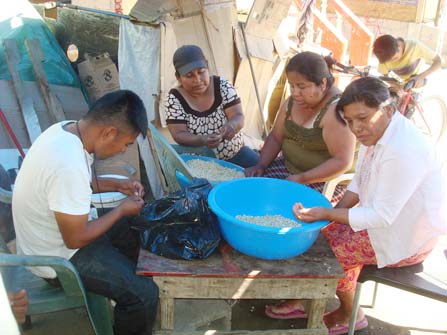
Farmworker Antonia Cruz (center right) says that the agrochemicals are a health threat. (Photo: Dahl McLean). (Click image to enlarge)
SAN QUINTÍN
It’s the afternoon before Children’s Day. The women are sitting around a big enamel pot, hulling dried kernels of lime-soaked corn for the traditional posole to celebrate the occasion.
“A gal who lives nearby gave us the corn. She’s going to give us a chicken in solidarity,” says Gerardo Sánchez López who accompanies them under the shade of a makeshift tent alongside the hot dusty main road through the city.
The solidarity is for the camped-out agricultural workers’ demand of higher wages and better conditions in the San Quintin Valley, home to an ever burgeoning tomato and berry farm-export industry.
By this date, April 29, the people under the tent and thousands like them from the fields along the Trans-Peninsular Highway have been on a wildcat strike for six weeks, blocking traffic, marching and boycotting the U.S. companies and subsidiaries that employ them.
The movement, by members and international supporters of the Alianza de Organizaciones Nacional, Estatal y Municipal por la Justicia Social en el Valle de San Quintin, has achieved front-page news coverage and a portion of its demands.
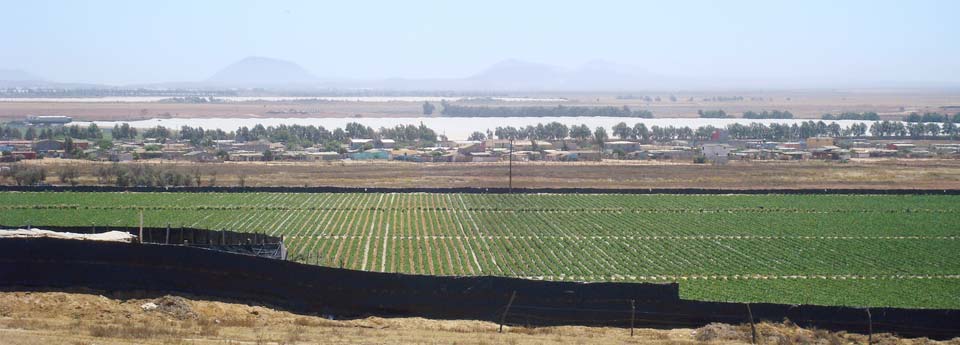
The San Quintín Valley is the center of a growing export industry of strawberries, tomatos and other fruits and vegetables. (Photo: Talli Nauman). (Click image to enlarge)
For example, employers have agreed to stop sexual harassment and now are checking job applicants’ birth certificates to make sure nobody younger than 15 years old is toiling in the fields, says farmworker Antonia Cruz.
Nonetheless, only a 15 percent raise for some and insufficient job protections for all were achieved in the month of struggle before the breakdown of bargaining with company and state negotiators, she laments.
She and her coworkers in the strawberry fields say they make $6.61 a day. They literally work from sun-up to sun-down. They must work on Sundays and holidays or get docked $18. They receive no pay-increase for overtime, contrary to federal law. They want $13 a day and the right to days off, just like all other employees have by law.
“We’re waiting for responses favorable to the farmworkers from the government and the companies,” Cruz tells Meloncoyote. “They addressed the easiest things but haven’t wanted to raise wages like we have been asking.”
Better health and safety conditions are among the guarantees that have not been so easy to achieve, she says. While some employers provide company doctors, clinics and exercise rooms, others don’t even make social security contributions.
“You have to work even if you have a cold and are coughing,” Cruz complains. “They don’t pay you sick leave.”
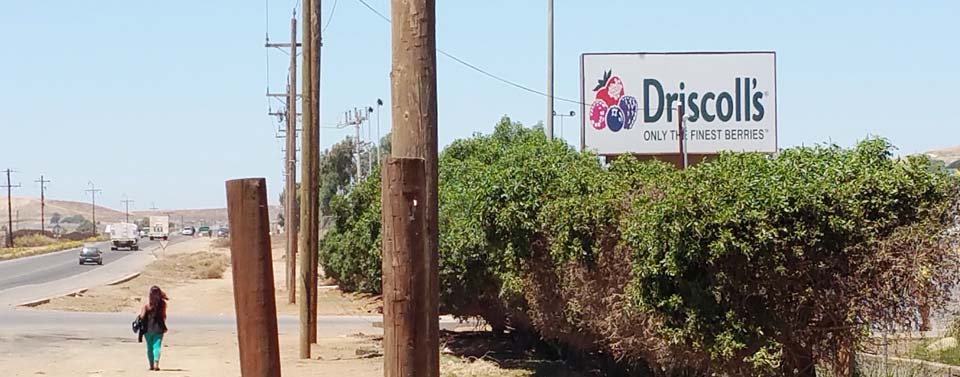
While some employers offer health care, doctors and recreation, others don't even contribute to the Social Security system. (Photo: Talli Nauman).
Agrochemicals are a big concern for the workers. “They fumigate you with tractors.” After handling blackberries and strawberries, “you break out in disgusting blemishes,” Cruz says.
“The chemicals that they put on the plants are very harmful to women, especially when they are pregnant,” Sanchez adds
“The bad thing is that we don’t know the chemicals or even their names,” Cruz says. “I only hear the word Tamaron.
Tamaron is Bayer’s brand of methamidophos, which is an organophosphate, belonging to the same chemical family as nerve gas, first developed as a weapon in biological warfare.
Because this insecticide can cause nervous and respiratory damage it is subject to the Prior Informed Consent procedures of the UN Rotterdam Convention under which signatory nations must formally approve or disallow imports based on products’ chemical risk.
Classified as a “highly hazardous poisonous substance” by the U.N. World Health Organization, the insecticide is outlawed in Great Britain and China; its use is restricted in the United States and India, among other countries.
Due to its high toxicity it can be fatal if inhaled or absorbed through the skin of farmworkers, domestic and wild animals.
For the health and welfare of workers and the general population, the WHO recommends handling and application of methamidophos “be entrusted only to competently supervised and well-trained applicators”, taking adequate safety measures.
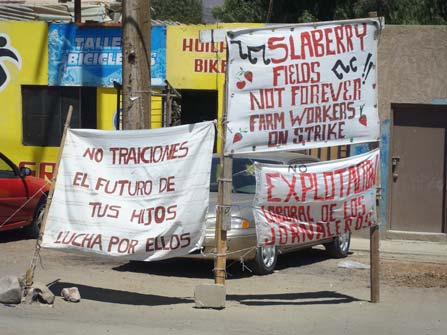
Striking farmworkers only managed to win a 15% pay raise and insufficient labor protections in the month of struggle before the collapse of negotiations with growers and authorties. (Photo: Dahl McLean). (Click image to enlarge)
Signs: "Don't betray your children's future, fight for it."
"No to exploitation of farmworkers."
According to WHO guidelines, protective clothing is a requirement; it should be laundered thoroughly and separately from family clothing.
Unprotected workers should be kept out of treated areas for 48 hours. Regularly exposed workers should receive appropriate monitoring and health evaluations, according to the organization.
However, Cruz says, no training, protective gear, waiting periods or observation are provided to farmworkers in the San Quintin Valley. “Those who can’t stand it, put a bandana over their face,” she says.
Cruz’ mother, who hailed from the southern Mexican state of Oaxaca, like many of the other farm laborers in the San Quintin Valley, died of exposure to the agrochemicals on the farms here, according to doctors.
“They discovered my mother had leukemia,” Cruz says. “She worked a long time in the fields, and they told her that had a lot to do with the cancer.”
As a child, Cruz recalls, her mother often “had no time to bathe” and wash away the chemicals. (“no tenia tiempo para banarse”). Cruz’ employer does not provide shower rooms, so she showers at home, she says.
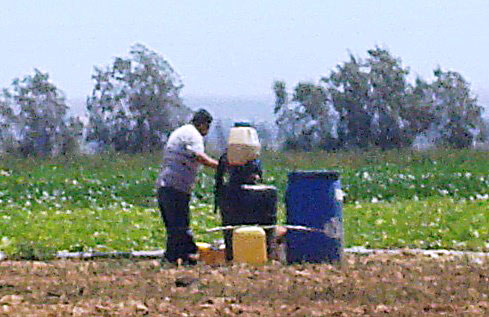
A worker in the field in Valle de San Quintin applies agrochemicals without the protective clothing recommended by the World Health Organization. (Photo: Talli Nauman).
Labor union representation, which is required by federal law in Mexico, has failed the farmworkers in garnering protections. “If we have a union, they never have told us that we have a union. The company pays it off,” she says.
Yet Cruz continues to work in the fields, she says, because she has no schooling to help her get a better job. A lot of single mothers in the fields can’t send their children to school because they are needed to work at home or in the fields, too, she notes.
However, her husband works in the fields, so between the two of them, they make it possible for their children, aged 15, 11, and four, to attend school and preschool.
“At least my children can study,” she says.
